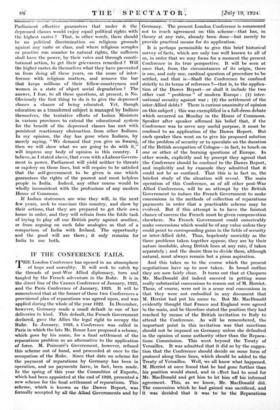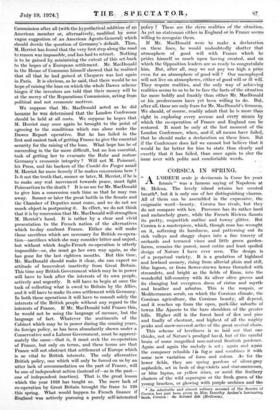IF THE CONFERENCE FAILS.
THE London Conference has opened in an atmosphere of hope and unreality. It will seek to catch up the threads of post-War Allied diplomacy, torn and tangled by the French adventure in the Ruhr. It is in the direct line of the Cannes Conference of January, 1922, and the Paris Conference of January, 1923. It will be remembered that at the former of these two Conferences a provisional plan of reparations was agreed upon, and was applied during the whole of the year 1922. In December, however, Germany made a small default in one of her deliveries in kind. This default, the French Government declared, gave the Allies the legal right to occupy the Ruhr. In January, 1923, a Conference was called in Paris in which the late Mr. Bonar Law proposed a scheme, which goes by his name, for a final settlement of the reparations problem as an alternative to the application of force. M. Poincare's Government, however, refused this scheme out of hand, and proceeded at once to the occupation of the Ruhr. . Since that date no scheme for the payment of reparations by Germany has been in operation, and no -payments have, in fact, been made. In the spring of this year the Committee of Experts, which had been appointed at the end of 1923, presented a new scheme for the final settlement of reparations. This scheme, which is known as the Dawes Report, was formally accepted by all the Allied Governments and by Germany. The present London Conference is summoned not to teach agreement on this scheme—that has, in theory at any rate, already been done—but merely to provide practical means for its application.
It is perhaps permissible to give this brief historical survey of facts, which are only too well known to all of us, in order. that we may focuS for a moment the present Conference in its true perspective. It will be seen at once that, from the circumstances of its origin, there is one, and only one, cardinal question of procedure to 'be settled, and that is—Shall the Conference be confined strictly to its terms of reference ?—that is, to the applica- tion of the Dawes Report—or shall it include the two other vast " problems " of modern Europe : (1) inter- national security against war ; (2) the settlement of the inter-Allied debts ? There is curious unanimity of opinion on this subject ; this was exemplified in a full-dress debate which occurred on Monday in the House of Commons. Speaker after speaker affirmed ,his belief that, if the Conference was to serve any useful purpose, it must be confined to an application of the Dawes 'Report. But each speaker then went on to give his proposed solution of the problem of security or to speculate on the duration of the British occupation of Cologne—in fact, to touch on one or other of the burning questions of Europe. 'In other words, explicitly and by precept they agreed that the Conference should be confined to the Dawes Report, and implicitly and by example they admitted that it could not be so confined. That this is in fact so, the briefest study of the situation will reveal. The main operation of this Conference, as of all other post-War Allied Conferences, will be an attempt by the British Government to induce the French Government to make concessions in the methods of collection of reparations payments in order that a practicable scheme may be evolved. But if this attempt is to have the faintest chance of success the French must be given compensation elsewhere. No French Government could conceivably make concessions which would be of any value unless they could point to corresponding gains in the fields of security or inter-Allied debt. Thus, hopelessly unwieldy as the three problems taken together appear, they are by their nature insoluble, along British lines at any rate, if taken separately ; and the desire thus to divide them, although natural, must always remain but a pious aspiration.
And this takes us to the course which the present negotiations have up to now taken.. In broad outline they are now fairly clear. It turns out that at Chequers Mr. MacDonald did indeed succeed in getting some really substantial concessions to reason out of M. Herriot. These, of course, were not in a sense real concessions in that they were not embodied in any document that M. Herriot had put his name to. But Mr. MacDonald evidently thought that France and England were agreed in the main, and he therefore stated the position they had reached by means of the British invitation to Italy to attend the Conference. As will be remembered, 'the important point in this invitation was that sanctions should not be imposed on Germany unless she defaulted in the opinion of some authority other than the Repara- tions Commission. This went beyond the Treaty of Versailles. It was admitted that it did so by the sugges- tion that the Conference should decide on some form of protocol along these lines, which should be added to the Treaty of Versailles. Well, we all know what happened. M. Herriot at once found that he had gone further than his position would stand, and in effect had to send for Mr. MacDonald and get him to' let him off his informal agreement. This, as we know, Mr. MacDonald did. The concession which he had gained was sacrificed, and it was 'decided that it was to' be the Reparations Commission after all (with the _hypothetical addition of an American member or, alternatively, modified by some vague suggestion of. an American Agents-General) which should decide the question of Germany's default. . Thus, M. Herriot has.found that the very first step along the road toreason was impossible, and has had to retract. Nothing is to. be gained by:.rninimizing the extent of this Set-back to the hopes of a European settlement. Mr. MacDonald in the House of Commons himself showed that he, realized that all that he had, gained at Chequers was lost again in Paris. It is obvious, as he said that there would be no hope of raising the loan on which the whole-Dawes scheme hinges if the investors are told that their money will be at the mercy of the Reparations Commission, acting frogi political and not economic motives.
We suppose that . Mr. MacDonald acted as he did because he was determined that the London Conference should be held at all costs. We suppose he hopes that M. Herriot may once again be brought to the point of agreeing to the conditions which can alone make the Dawes Report operative. But he has failed in the first and easiest task of getting France to give the essential security for the raising of the.loan. What hope has he of succeeding in the far more difficult, but no less essential, task of getting her to evacuate the Ruhr and restore Germany's economic integrity ? Will not M.. Poincare, his Press, and his backers of the Comite des Forges assail M. Herriot far more fiercely if he makes concessions here ? Is it not the truth that, sooner or later, M. Herriot, if he is to make any real movement towards peace, must fight Poincareism to the death ? It is no use for Mr. MacDonald to give him a concession each time so that he may run away. Sooner or later the great battle in the Senate and the Chamber of Deputies must come, and we do not see much object in postponing it. In effect, we do not think that it is by concession that Mr. MacDonald will strengthen M. Herriot's hand. It is rather by a clear and vivid presentation to the French nation of the alternatives which to-day confront France. Either she will make those sacrifices which are necessary for British co-opera- tion—sacrifices which she may consider bitter and unjust, but without which Anglo-French co-operation is utterly impossible—or, she must go her own way again, as she has gone for the last eighteen months. But this time, Mr. MacDonald should make it clear, she can expect no attitude of benevolent inactivity from Great Britain. This time any British Government which may be in power will have to look after the interests of its own people, actively and urgently. It will have to begin at once the task of collecting what is owed_ to Britain by the Allies, and it will have to make its own settlement with Germany. In both these operations it will have to consult solely the interests of the British people without any regard to the interests of France. If Mr. MacDonald told France this, he would not be using the language of menace, but the language of fact. Whatever the sentiments of the Cabinet which may be in power during the coming years, • its foreign policy, as has been abundantly shown under a Conservative and a Labour Government, must be approxi- mately the same—that is, it must seek the co-operation of France, but only on terms, and these terms are that France will not.obstruct that settlement of Europe which is so vital to British interests. The only. alternative British policy, one which will only be forced on us by an utter lack of accommodation on the part 'of France, will be one of independent action (instead of—as in the past— one of independent inaction). That is the great lesson • which the year 1923 has taught us. The mere lack of co-operation by Great Britain brought the franc to 120 this spring. What would happen to French finance if ,-England was actively pursuing a purely self-interested , policy 7 These are the stern realities of the situation. Aa yet no statesman either in England or in France seems willing to. recognize them.
If Mr. MacDonald were to make a declaration on these lines, he would undoubtedly shatter that atmosphere of , griod will with France which lie prides, himself so much upon having created, and op which the Opposition leaders are so ready to congratulate him. But, after all, may we e not pay too high a price even for an atmosphere of good will ? Our unemployed will not live on atmospheres, either of good will, or ill whir . They require realities, . and the only , way of achieving realities seems to us to be to face the facts of the situation far more boldly and frankly than either Mr. MacDrinaid or his .predecessrirs have yet been willing to do. But, after all, these are fears for Mr. MacDonald'i firmness. We should, of course, readily admit that he is more than right in exploring every avenue and every means by which the co-operation of France and England can be restored. It must be only at the last moment of the London Conference, when, and if, all means have failed-, that he should make a declaration on these liries. Exit if the Conference doeS fail we cannot but belieVe that it would be far better for him to state thus clearly and exactly that it has failed, than once again to slur the issue over with polite and comfortable Words.







































 Previous page
Previous page